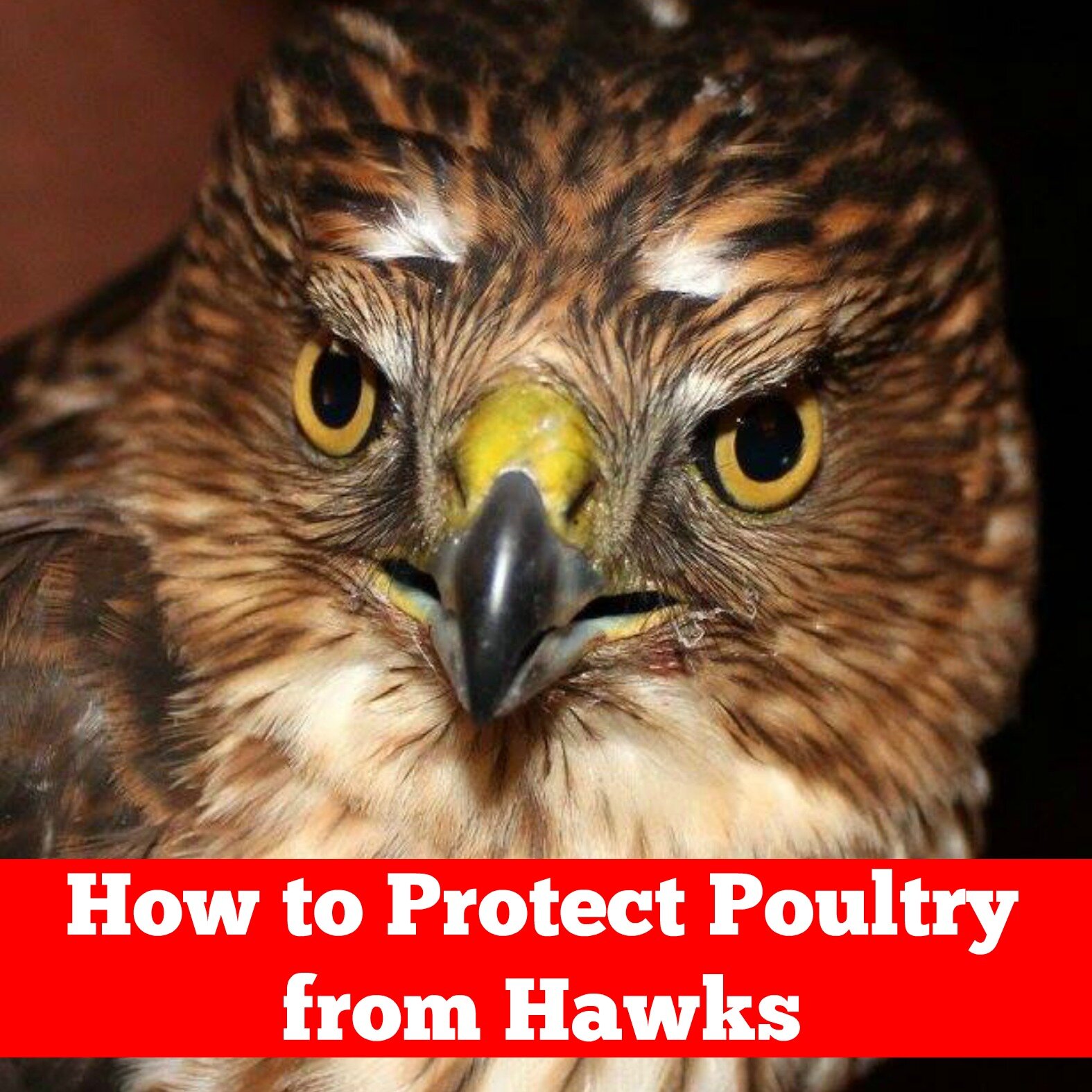
Raising poultry, such as chickens and ducks, take a lot of investment in time and care. The last thing anyone wants is to loose a flock member to a predator. But ever Spring and Fall, raptors migrate in great numbers. And while you can build a “better fence” to keep out ground predators, how do you protect your poultry from hawks?!?!
Free Range vs. Runs
Everyone has their own opinion on weather to free range their flock or to keep them in a run. I will tell you I have had experiences with both forms of flock management over the 30+ years I have been involved with poultry. While I am not here to tell you what is best for your birds, I will simply give you my experiences and tips to help keep your poultry safer. Each option of flock management comes with its pros and cons. We are not here to decided which is best, we are here to talk about hawks and how to protect your poultry!
Runs
If you do keep your flock in a run, the most important thing you can do it put a roof on the run. I know it sounds simple, and it is, but many people think of ground predators, not things attacking from the sky! As in our neighbor’s case, she had a high enough fenced in run to keep her chickens in, but the top was completely open, thus allowing hawks and owls easy access to her flock.
When choosing materials for your run roof, you will need to take into consideration a few factors. Do you want a temporary or permanent solution? What is your budget? Are you willing to take risks? While a tarp might appear to be a solid barrier, hawks are smart. They will sit and watch your run looking for weakness.

This particular hawk spent day after day (in the rain!) sitting on our fence scooping our our free range flock and our neighbor’s chicken run. In the end it attempted to go after her birds. Why? Have you ever heard the phrase “shooting fish in a barrel?” After much observation, this hawk realized the tarp covering her run was not solid and after pacing around it all day, identified the areas where the tarp would flap up in the wind and he could enter.
Some folks use fishing wire or yarn to make a web across the tops of their runs. While this might work for some, it is a temporary solution as the hawks will figure it out and the material deteriorates over time. If you are looking for a permanent solution your best bet is wire. Chicken wire and hardware cloth are both great options but will cost more and take more time to install. Bird netting is also a choice, but attention to detail is a must to make sure there are no gaps that a hawk will be able to work its way through.
Free Range options (that also work great for runs!)
Your flock is not a buffet. Do not make it easy for hawks to pick off members of your flock! By using a combination of these tactics, you can discourage and repel hawks!
Ground cover
Make sure your property has plenty of “hiding spots.” We leave the perimeter of our property very natural with lots of bushes to dart in and raspberry patches to provide hard to penetrate strong holds. Of course their pop door is always open, so they can take cover in a structure if they are close enough. That being said, I have seen a hawk walk in a pop door before! Ground cover is also important in runs as it gives your flock a sense of safety and allows to the hide should they feel threatened.

Get a gaurd
No, I don’t mean send your kids out with a BB gun! Shooting birds of prey is actually a crime. What I mean is have a rooster to stand guard and alert the flock of danger. Unfortunately in many urban areas, having a rooster is not an option. Many local ordinances strictly prohibit roosters due to crowing. Our solution was to fill the rooster’s role with a drake, aka male duck. Male ducks are actually quieter then the females but still provide excellent protection. Our drake alerts not only our female ducks, but our laying hens always head his alerts. Another option is a LGD or Livestock Guard Dog. These dogs, when trained properly, will defend your flock like a mama bear.
Visual deterrents
Other options available to deter hawks include scarecrows. The down side to using one is that you need to move it often. The trick is to make the hawk think that people are constantly around. Sadly I have heard stories from folks who have had chickens snatched 10 feet from them, so this option is not very reliable.
Another visual option that works much better are reflective type items. Weather you want to hang old CDs, or dollar store Mylar balloons, something about the silver color and movement of these items tends to startle birds of prey. Another option is Nite Guard Repellent Tape. It has all the flash of the Mylar balloons but provides auditory deterrent as well as it cracks and snaps in the wind.

The balloons were the option my neighbor went for, but as I said, hawks are smart, they watch, they learn…. Even after providing a temporary run cover, adding in pine bows and boxes for hiding, even Mylar Elmo was no help in deterring the hawk. Can I just say once again, hawks are SMART! Being vigilant and pulling out all the tricks in the books sometimes isn’t enough. Some times you have to invest a little more for a roof that works or spend the money later to replace your flock.
And I know you are wondering….. yes we free range. No we have not lost a flock member to hawks….. yet. I know it is always a possibility but we provide out flock with the best options we can under the management style we have chosen. Our birds have a guard, lots of places to scatter should our drake alert, and they have an ever vigilant keeper who would lock their butts up in a heartbeat if I thought it would protect them any better.
Final note, don’t feed the birds!
While many folks enjoy bring songbirds to their property by placing wild bird feeders, as a poultry keeper it is an activity that can be detrimental to your flock. Hawks enjoy grabbing a quick meal and bird feeders provide a smorgasbord of opportunity. As the number of wild birds increase, so will your hawk population.



Great advice! Hawks are terribly bad this year so we are building an enclosed run. I just can’t take the chance of losing any of my girls. They do just fine free ranging and have plenty of cover and I will still free range them while supervised.
I am worried about our new silkies. Nothing says “eat me” like being a little puffy white marshmallow!
We just got a new batch of ducklings, so I appreciate these tips. Thanks!
Your welcome! Enjoy all that adorable cuteness!!!
We haven’t lost any to hawks yet…although there was one mystery death. But we have had problems with fox and possum. 🙁 Found your post on the Simple Homestead hop!
Opossums (at least around here) tend to go for the eggs first. We have had them in the coop a few times. Now fox. Those dirty bandits. You never see them and then boom. I feel for you. We had a weasel of all things get a few of ours!
Great tips! Thanks for sharing with Party in Your PJs!
Thanks for hosting!